Former Iranian Diplomat Says US Envoy Malley ‘Was On Our Side’
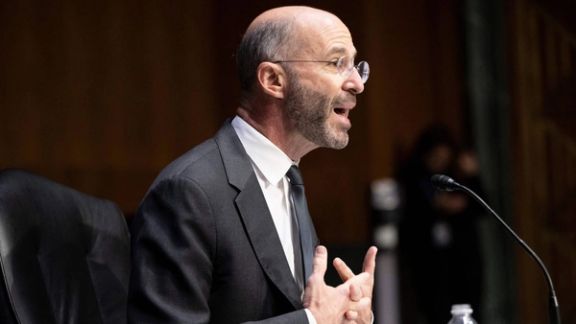
Iran was not able to utilize the presence of US envoy Robert Malley to resolve its nuclear dispute with the United States, a former Iranian diplomat said Monday.

Iran was not able to utilize the presence of US envoy Robert Malley to resolve its nuclear dispute with the United States, a former Iranian diplomat said Monday.
Iran International broke the news June 29 that US special envoy Robert Malley was suspended, and his security clearance status was under investigation.
Javid Qorbanoghli, a former Iranian diplomat was quoted as saying by Entekhab website in Tehran that Malley could have helped Iran resolve the nuclear issue. He added that Malley “was on our side” and his talks during secret meetings with Iran’s UN ambassador Saeed Iravani in New York had made progress.
“Malley, as the top person in this [nuclear] file and chief [US] negotiator was on our side, and in talks with Iravani took steps to free frozen assets [in exchange] for prisoners and…”
The former diplomat said that Israel was angry and alleged that it “succeeded to separate Malley from this file,” with using one security issue.
From the time Malley was appointed as special envoy by President Joe Biden in early 2021, many observers said that he was sympathetic toward the Islamic Republic and not a suitable choice. Critics noted his role in engineering the 2015 JCPOA agreement that they believed was advantageous to Iran, not the United States.
Apparently, Malley was suspended as early as the beginning of May, but the State Department did not share the information with Congress. Lat week, several lawmakers began objecting to lack of candor by the administration.
House Foreign Affairs Committee Chairman Michael McCaul sent a letter demanding more information from the White House about Malley’s status.
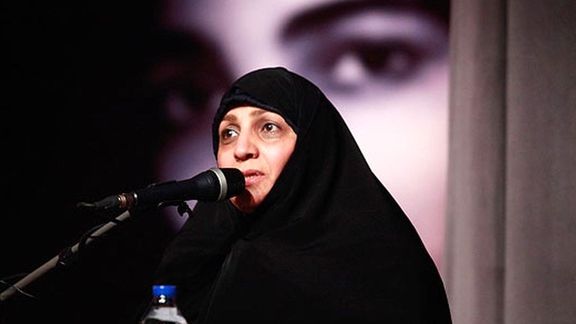
Iran’s appointment last week of Massoumeh Abad, a midwife, as ambassador to Finland has raised some eyebrows among former diplomats and commentators in Tehran.
Former Iranian diplomat Fereydoun Majlesi has said sarcastically in an interview with Didban Iran website that: "Ms. Abad can now help the pious in Finland to deliver their babies in the Islamic way."
Although Majlesi's view can be challenged for its political incorrectness, his criticism of the irrelevance of the appointment looks valid, because the appointee has no relevant experience.
Iranian ambassadors are usually selected from the ranks of career diplomats or experienced political, military figures.
Referring to Abad's career record and her diplomatic mission, Majlesi said that the Islamic Republic has no serious presence in the international arena, so it does not need a professional diplomat for such a mission."
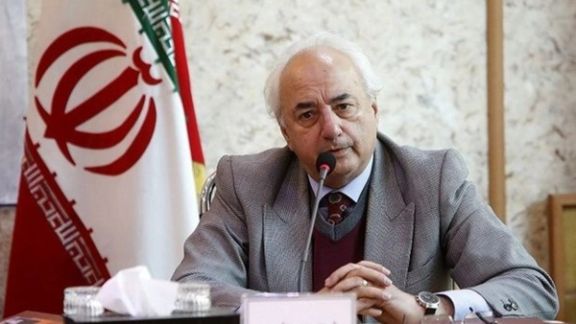
He also quipped that most probably the ambassador can be a good host at parties with Muslims in Helsinki.
It was not only Majlesi who criticized Abad's appointment. It raised a wave of uproar from Iranians on social media. Protests in this regard came even from among political supporters of the current government. The Student Basij of Imam Sadeq University, one of the most hardline political and militia organizations in Iran, wrote in a tweet June, 28: "How has she been appointed as an ambassador after serving as a Tehran City Councillor and the head of the maternity ward of Najmiyeh Hospital? Is this meant to make the role of Iranian women prominent in the international public opinion?"
On Twitter, user Naji Ali presented a document that Ms. Abad was one of those involved in the "astronomical real estate" corruption case at the Tehran Municipality under current parliament speaker Mohammad Bagher Ghalibaf who gave her some property at an extremely low price.
According to Didban Iran, Massoumeh Abad was a prisoner of war for some time during the Iran-Iraq war in the 1980s and has written her memoirs in a book entitled: "I am alive." She has a doctorate from the Shahid Beheshti University in the field of fertility and has been a member of the Tehran City Council twice.
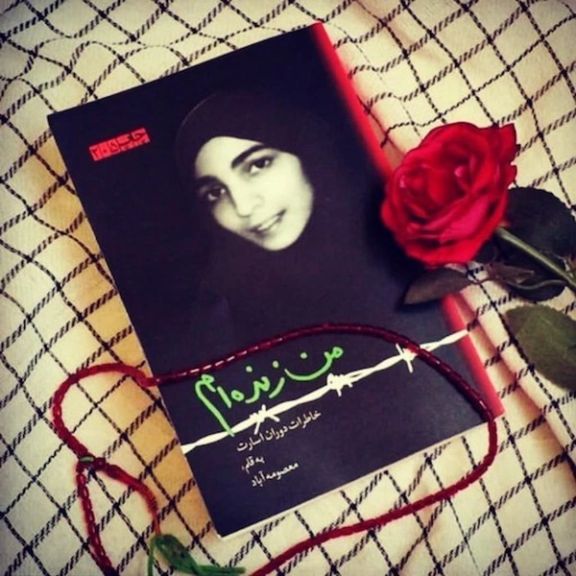
The website also confirmed that Abad was implicated in the "astronomical real estate" case, which became public in 2017 as part of a huge corruption case involving the mayors’ closest aides who were Revolutionary Guard officers. Eventually, two top people were convicted by a military tribunal. It was reported at the time in local media that embezzlement and give away of city property totalled at least five billion dollars.
The website added that now that President Ebrahim Raisi has appointed several Imam Sadeq University (a dubious religious university) alumni as his cabinet ministers, it is not strange to appoint a midwife as an ambassador.
Media reports say Abad is Iran's fifth female ambassador since the 1979 revolution. Previously, Marziyeh Afkham, a career diplomat and a former foreign ministry spokesperson was appointed ambassador to Malaysia, and Afsaneh Nadipour, Forouzandeh Vadiati, and Homeyra Rigi were appointed as ambassadors in Denmark, Finland and Brunei.
Former diplomat Majlesi observed that "When the circle of government insiders is getting increasingly smaller, then they do not have any real expert to appoint to key posts."
He added that Iran has been buying expensive buildings abroad for a long time to use as premises for embassies and someone like Ms. Abad can certainly attend to the building and keep it in a good shape.
Social media users have pointed out that Abad's husband, Sayyed Safar Salehi was previously appointed to a mission to forge oil deals in the UK. Others on social media said that the reason for Abad's extra-ordinary promotion is that she was the gynaecologist of one of Supreme Leader Ali Khamenei's daughters-in-law.
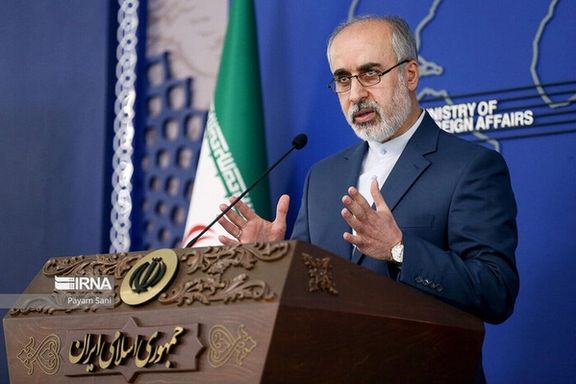
Iran’s foreign ministry says Tehran has seen positive steps in recent negotiations on Iran's nuclear issue, though claims they do not meet regime demands.
"We have seen [a] moving away from the non-constructive atmosphere and destructive politics in the opposite parties," Nasser Kanaani told a weekly presser on Monday.
Seemingly referring to covert talks with the US, which the US continues to deny, Kanaani also said however, that the talks are still "not enough", though did not elaborate further.
About two weeks ago, another round of negotiations was held between Ali Bagheri-Kani, Iran's Chief Nuclear Negotiator, and Enrique Mora, the Deputy Secretary General for Political Affairs and Director of the European External Action Service, in Doha.
One day after the meeting, CNN quoted an informed source as saying that the discussion appears to be “leading to positive developments on many issues.”
According to CNN, it seems a momentum is building to revive the talks over Iran's expanding nuclear program.
CNN also added that the meeting focused on key sticking points, including nuclear enrichment levels and Iranian cooperation with the International Atomic Energy Agency.
However, on Sunday, the Guardian wrote that the three European countries that signed the JCPOA plan to breach the JCPOA for the first time by refusing to lift sanctions against the Islamic Republic.
In recent days, the forced leave of the United States Special Representative for Iran Robert Malley, has fueled the uncertainties about the talks between the United States and Tehran.
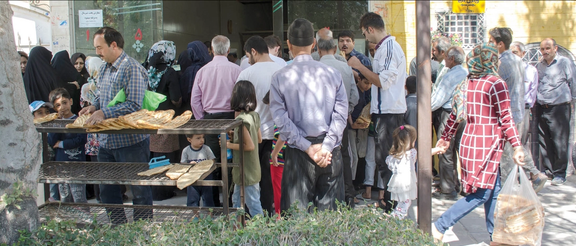
According to reports received by Iran International subsidized bread is only available in limited amounts in some Iranian provinces causing long queues.
Confirming the reduction of the subsidized flour quota and bread rationing in some regions, an informed source told Iran International: "The plan to increase the price and pay the bread subsidy to the low-income people instead is under review."
Mohammad Jalal, the Director of the Flour and Bread Subsidy Smart Plan also confirmed the long queues of bread in some provinces, saying: "This issue is caused by the increase in the demand amid the rise of travels and also the displacement of seasonal workers."
More than a year has passed since the start of the flour and bread subsidy smart plan. According to the claim of the executives, this plan has been implemented with the aim of preventing the smuggling of flour and bread to neighboring countries and preventing the annual waste of more than 4 million tons of bread in Iran.
The government had also claimed the price increase and rationing of traditional bread are their red lines.
Implementation of the subsidy plan has brought problems for bakers and bread buyers. Bakers complain about low prices, while bread production costs are on the rise.
The subsidy was introduced in April 2018 when former US president Donald Trump signaled his intention to withdraw from the Obama-era nuclear agreement with Iran known as JCPOA, and Iran’s national currency began to nosedive. Prices for imported goods skyrocketed and the government decided to provide cheap dollars to importers of essential goods to keep prices low.
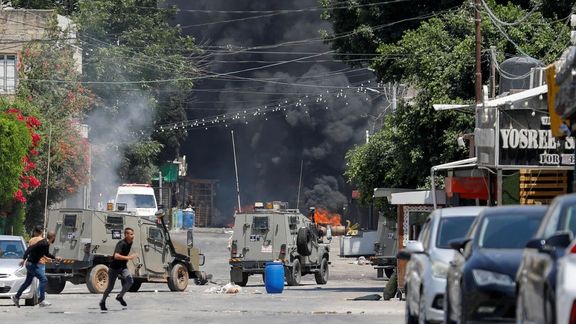
Israel says its ongoing offensive in the Palestinian city of Jenin in the West Bank is aimed at Iran-backed militant groups Palestinian Islamic Jihad and Hamas.
Foreign Minister Eli Cohen said Monday: "We don’t have a fight with the Palestinians, actually, our fight is with the proxies of Iran in our region, which is mainly with the Hamas and the (Palestinian) Islamic Jihad, both terrorist organizations financed by Iran.”
He went on to say that "due to the terror organization and the funds they receive from Iran, the Jenin camp has become a center for terrorist activity”.
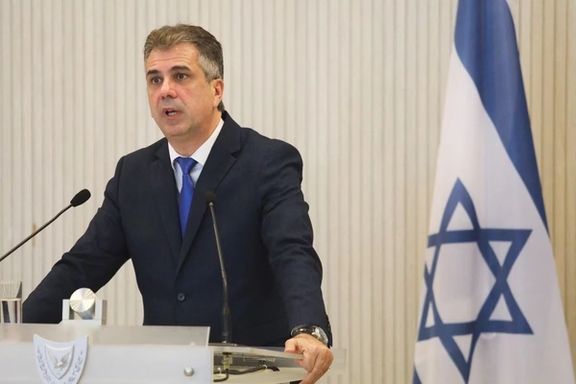
The incursion, which resembled the wide-scale military operations carried out during the second Palestinian uprising two decades ago, took place two days after the Islamic Jihad's Secretary-General Ziyad al-Nakhala said that anti-Israeli actions in the West Bank reflect Iranian Supreme Leader’s directives.
“There was a great focus in order for the West Bank to move from a state of coexistence and calm, to a state of resistance that we see today, and of course all of this is under the directives of Ali Khamenei,” stated al-Nakhala. He said the recent visit to Tehran was crucial: “During our last meeting with him in Tehran, he renewed the call for that and for the development of resistance in the West Bank.”

Israel sent drones to strike targets in a militant stronghold in Jenin early Monday and deployed hundreds of troops in the area. The attack set off a gunbattle lasting into the morning. Israeli troops remained inside the Jenin refugee camp at midday Monday.
Lt. Col. Richard Hecht, an army spokesman, said the goal of the operation was to destroy and confiscate weapons, adding: “We’re not planning to hold ground. We’re acting against specific targets.”
The foreign minister's remarks were echoed by the Israeli Ambassador to the United States Mike Herzog, who also said on Monday that Jenin and its refugee camp have become a base for Iran and that Israel cannot stand by as its citizens are targeted by terrorists.
The operation followed growing domestic pressure for a tough response to a series of attacks on Israeli settlers, including a shooting attack last month that killed four Israelis.
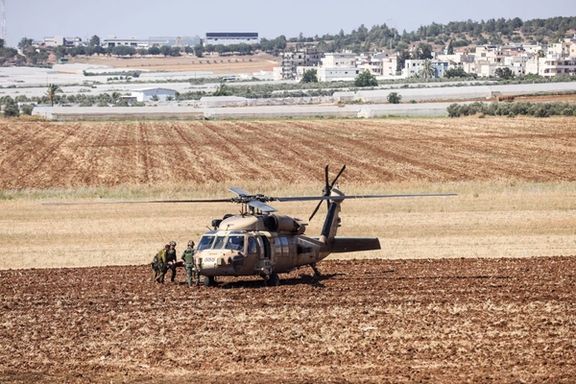
Retired Brig. Gen. Amir Avivi, who served as a battalion commander in the northern West Bank in 2002, described Monday’s operation as a “raid” in which the army moves in and then withdraws, but added that the size of the force indicated the operation could last “for a longer period of time, not just a few hours, but maybe a few days.”
Palestinian health officials said at least seven Palestinians were killed and 27 wounded in Jenin, while another man was killed in the city of Ramallah after being shot in the head at a checkpoint. In Ramallah, Palestinian Prime Minister Mohammad Shtayyeh condemned the Israeli military raid, calling it a "new crime."

Iran’s Foreign Ministry spokesman Nasser Kanani described the attack as a “tragic incident” and an example of “state terrorism,” but went on to add a line of the regime’s propaganda in it, saying: “Crime is institutionalized in the nature of the Zionist regime. The latest crime in Jenin showed once again that peace and compromise cannot deter the regime’s war machine and that this regime is neither trustworthy nor seeking peace.”
Iran International reported in May that Iran has also urged Hamas to join Islamic Jihad in a new round of attacks against Israel following the killing of three militants in Gaza. Tehran exerted strong pressure on Hamas to respond to assistance it has received over the years and unite with Islamic Jihad to launch a fresh wave of attacks, informed sources said.

According to Israeli Defense Minister Yoav Gallant in April, Iran is the “driving force” of a recent multi-front escalation with Israelis through its proxies across the region, funding Hamas – that rules the Gaza Strip -- with $100 million annually with additional funding worth tens of millions of dollars going to the second largest terror group in the Palestinian enclave, the Palestinian Islamic Jihad. Galant said the regime also provides Hezbollah in Lebanon with $700 million a year, as well as “knowledge and strategic weaponry” such as precision-guided munitions.
The evolution from guerrilla-terrorist militias to armies results from a long process initiated by Tehran with the active assistance of Hezbollah in Lebanon. The escalating events in recent months have shown the ongoing coordination and consultation among the top leaders of Hamas, Hezbollah and PIJ in Beirut, Damascus, and Tehran, with the aim of creating a united front facing Israel from Iran-supported Lebanon, Syria, Gaza, and the West Bank.

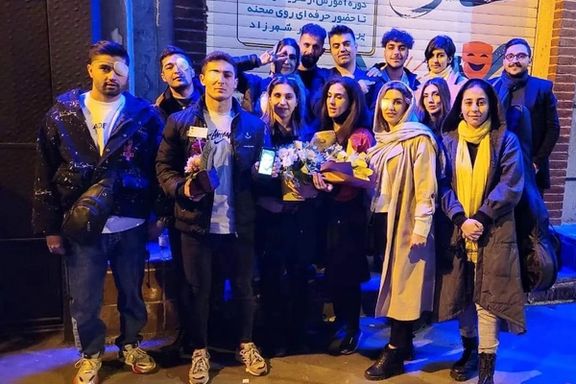
The spokesperson of the French Foreign Ministry reacted to criticism from her Iranian counterpart over the handling of protests, slamming Iran's record of killing and blinding protesters.
Referring to the protests which have erupted in France following the death in police hands of a young Muslim, Anne-Claire Legendre said: “We understand your concern for human rights and the lives of French citizens ... and for this reason, we will not kill anyone with a weapon of war, nor will we shoot an eye to blind it!”
Legendre's comments came after Spokesman for the Iranian Ministry of Foreign Affairs Nasser Kanaani “advised the French government and police to take into account the demands of the protesters while exercising restraint and avoiding violence,” the issue widely covered in Iranian state media.
Legendre was referring to the killing of hundreds of protesters by the Iranian regime in the months following the death in custody of Mahsa Amini in September. The Islamic Republic security forces have also been systematically targeting protesters’ eyes.
Norway-based Iran Human Rights on Friday documented over 20 cases of people being blinded in one eye as a result of fire from the security agents during protests, adding that initial data indicates that young women were disproportionately represented among people who had sustained such wounds.
The group claimed that Iran Human Rights researchers have collected and verified information related to many citizens who have lost their sight in one or both eyes as a result of being shot with shotguns or paintball guns in the nationwide protests in recent months. The report also provided a list of cases independently verified by their researchers, noting that the real number is much higher.